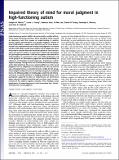Impaired Theory Of Mind for Moral Judgment in High-Functioning Autism
Author(s)
Moran, Joseph M.; Young, Liane L.; Saxe, Rebecca R.; Lee, Su Mei; O'Young, Daniel; Mavros, Penelope L.; Gabrieli, John D. E.; ... Show more Show less
DownloadGabrieli-Impaired theory.pdf (258.0Kb)
PUBLISHER_POLICY
Publisher Policy
Article is made available in accordance with the publisher's policy and may be subject to US copyright law. Please refer to the publisher's site for terms of use.
Terms of use
Metadata
Show full item recordAbstract
High-functioning autism (ASD) is characterized by real-life difficulties in social interaction; however, these individuals often succeed on laboratory tests that require an understanding of another person's beliefs and intentions. This paradox suggests a theory of mind (ToM) deficit in adults with ASD that has yet to be demonstrated in an experimental task eliciting ToM judgments. We tested whether ASD adults would show atypical moral judgments when they need to consider both the intentions (based on ToM) and outcomes of a person's actions. In experiment 1, ASD and neurotypical (NT) participants performed a ToM task designed to test false belief understanding. In experiment 2, the same ASD participants and a new group of NT participants judged the moral permissibility of actions, in a 2 (intention: neutral/negative) × 2 (outcome: neutral/negative) design. Though there was no difference between groups on the false belief task, there was a selective difference in the moral judgment task for judgments of accidental harms, but not neutral acts, attempted harms, or intentional harms. Unlike the NT group, which judged accidental harms less morally wrong than attempted harms, the ASD group did not reliably judge accidental and attempted harms as morally different. In judging accidental harms, ASD participants appeared to show an underreliance on information about a person's innocent intention and, as a direct result, an overreliance on the action's negative outcome. These findings reveal impairments in integrating mental state information (e.g., beliefs, intentions) for moral judgment.
Description
This article contains supporting information online at www.pnas.org/lookup/suppl/doi:10.
1073/pnas.1011734108/-/DCSupplemental.
Date issued
2011-02Department
Massachusetts Institute of Technology. Department of Brain and Cognitive SciencesJournal
Proceedings of the National Academy of Sciences
Publisher
Proceedings of the National Academy of Sciences (PNAS)
Citation
Moran, J. M. et al. “Impaired Theory of Mind for Moral Judgment in High-functioning Autism.” Proceedings of the National Academy of Sciences 108.7 (2011): 2688–2692. Web. 30 Mar. 2012.
Version: Final published version
ISSN
0027-8424
1091-6490